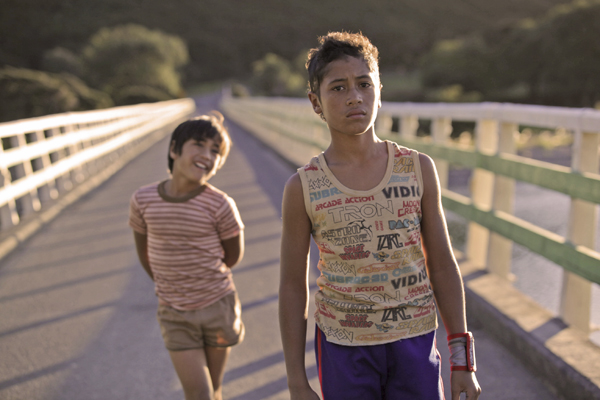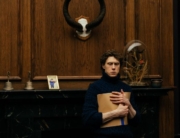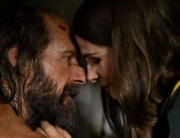
Rocky (Te Aho Eketone-Whitu), left, and Boy, played by James Rolleston (Paladin)
Boy gives delightful new meaning to “It takes a whole village to raise a child” by nostalgically going back to an isolated community where kids were pretty much left to themselves. The talented multi-hyphenate writer/director/actor/artist Taika Waititi returned to his hometown on the rural, most northern island of New Zealand for a lighthearted perspective on growing up Maori in the mid-1980s.
Eleven-year-old Boy (James Rolleston) earnestly introduces himself to the audience through a very imaginative autobiographical school report, which includes a highly fanciful description of his father as a great adventurer. (Waititi amusingly acts out these various heroic guises as the absent-for-seven-years dad Alamein, named for a World War II battle where Maori served with distinction.) A classmate sneers that their dads are actually in jail together, which just sets Boy off picturing Alamein in a daring escape.
When Boy isn’t imagining his father’s feats or playing with his pet goat, he’s obsessed with Michael Jackson, including imitating his dance moves to impress the cool girl in the schoolyard. His six-year-old brother Rocky (Te Aho Eketone-Whitu) also has a vivid imagination. Immersed in comics, he transmits superhero powers through delightful animation. (Waititi created the adorable animation that expresses Rocky’s feelings.) But Rocky is guilt-ridden that somehow his powers killed his mother in childbirth, and he communes with her at her grave.
At home, their houseful of young cousins is left to fend for themselves when their grandmother heads off to a distant funeral, but they seem used to taking care of each other. The kids also hang out on the fringes of the grown-ups’ hang outs, including a charming scene that comes out of Waititi’s first short film, the black-and-white Academy Award-nominated “Two Cars, One Night” (2005) that inspired this feature, where parents leave a boy and a girl to their own flirtatious devices outside the local pub.
When Boy and Rocky’s father really does show up, proffering randomly filched presents, he is uncomfortable staying in the house he grew up in, or even being called dad. He feeds Boy’s image of him as a traveling samurai, buddying up to him as Big Shogun, with pot-fueled dreams of riding dolphins together with Boy, his Little Shogun (in more animated daydreams). Alamein even engages in his own escapist fantasies in a wannabe gang with two ex-cons. (Their posturing does get a bit silly.) But he’s really come back for buried treasure, the money he hid from his last robbery. Plot complications ensue amidst terrific musical dance numbers (songs by New Zealand indie rock band the Phoenix Foundation are interspersed with traditional chants and choruses), and the lessons learned by father and sons are sweet without being heavy-handed or maudlin.
Waititi is well-known for his work with New Zealand’s new wave of comedy, including his first feature Eagle vs. Shark (2007) and HBO’s Flight of the Conchords. But he is also part of the new wave of Indigenous filmmakers in the Antipodes, including Rachel Perkins (Bran Nue Dae), who are looking to get away from the noble images or depressing fare that have more frequently portrayed aboriginal communities, from Lee Tamahori’s Once Were Warriors (1994) to Warwick Thornton’s Samson & Delilah (2009). Boy is even filmed in his grandmother’s house and the small school he attended, and he cast local kids who cheekily insisted on improvising. Warning: the kids speak with very thick accents (I confess I thought they were referring to another musical icon, Bob Marley, when they were saying “Maori”), but added subtitles wouldn’t penetrate their heavy slang. Regardless, the colorful visuals and the sometimes overly broad sight gags communicate in a universal language (and there’s a closing funny bit right after the credits). This heartwarming film is so infused with an affection for the past, including for Michael Jackson as an icon for people of color, that it leaves one curious to see more films about growing up Maori today.






Leave A Comment